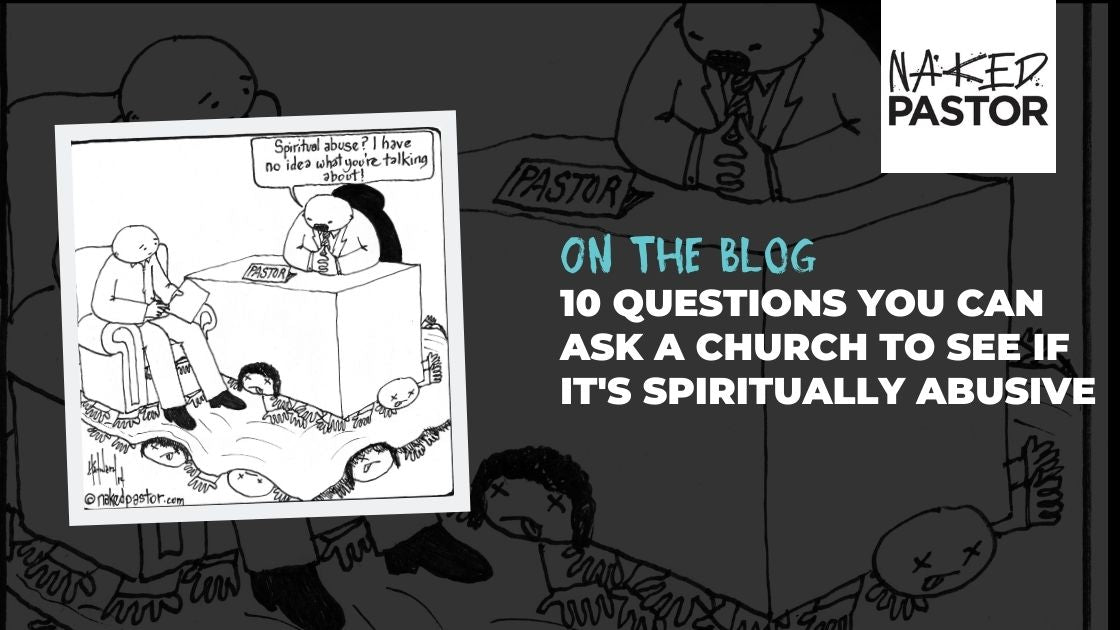What is Spiritual Abuse?
Spiritual abuse is when religious or spiritual beliefs are used to harm, control, or manipulate individuals. It involves the misuse of power by religious leaders or groups, often causing emotional, psychological, or physical harm to people by imposing strict rules, guilt, fear, or shame.
Why Do We Need To Talk About Spiritual Abuse?
I think it is important for churches to establish rules concerning how it treats its members. In any relationship, those involved need to constantly ensure that they are treating the other fairly, compassionately, and justly. This includes churches. Please.
I've come to believe that all churches are prone to spiritual abuse. In fact, I claim that the dehumanization of people is the gravitational pull of all institutions and organizations.
So we must be always on guard to ensure that they resist this tendency. It takes a lot of diligence, honesty, and hard work.
10 Questions You Can Ask A Church To See If It's Spiritually Abusive
I've assembled 10 questions you can ask the church to see if it is spiritually abusive or not. If any of these apply, I would claim that this particular church is not a healthy one and should be avoided.
1. Does it use guilt, shame, or fear to motivate me?
Everyone should know by now that although guilt, shame, and fear can motivate people, we also know that it is not the best motivator for human behaviour. True, to use any of these to prevent a person from harming another, for example, works at the time. But to motivate others to do good in the world, the motivators should be good too.
2. Does it elevate its wellbeing over mine?
When the organization is more important than the people who belong to it, then then people will suffer. This is a very real dilemma for churches, because the number one mission of an organization is to survive… just like people! But the people should always come first.
3. Does it employ peer-pressure to make me behave a certain way?
I believe diversity makes the healthiest communities. Unfortunately, most organizations prefer homogeneity. Conformity to its desired standard is expected of all its members. This will crush your individuality, authenticity, and self-expression.
4. Does it believe it possesses the truth and I don’t?
This is what makes a cult a cult. When any person or organization claims to have the truth and therefore you need them, this demands that you become a mindless sheep, an obedient follower, and a silent recruit.
5. Does it speak to me before it listens to me?
If any person or organization doesn’t listen to you and your needs and desires, its because it is not interested in them. In fact, they will inform you of what you need and want. As a result, you will have to hide your true self in order to belong.
6. Does it try to distance me from my other relationships?
Setting oneself apart often turns into separating oneself from all outside influences. At first, it may appear that you are just caught up in the excitement of the community. But over time you realize that you no longer have any contact with people who loved you. Isolation is a key strategy of abusers.
7. Does it punish me with demotion, isolation, or silent-treatment if I question anything?
Questioning authority is hardly ever appreciated by authority. But in order for you to be free, it must be done. If you raise legitimate questions and there are negative repercussions, this is abuse.
8. Does it trivialize or dismiss my feelings?
Your feelings don’t matter in an abusive relationship. In fact, your feelings can get in the way of the church’s agenda. In abusive relationships, we are taught to distrust our feelings and blindly trust the ones in authority over us.
9. Does it get jealous if I seek spiritual aids elsewhere?
Abusers are very jealous. They don’t want you going anywhere else for anything. In fact, they claim they will meet all your needs. This is another form of isolation. Abusers want you all for themselves.
10. Does it always blame me when something goes wrong?
If anything bad happens, it’s always your fault. Either you as an individual or the people as the community. Never the leader’s! And because our self-esteem has been so eroded over time, we believe them and accept all blame for anything bad that happens.
You know you can take these same 10 questions and apply them to any relationship. Even your marriage, family, or friendship!
For example, "Does he use guilt, shame, and fear to motivate me?” "Does he trivialize or dismiss my feelings?" If you can answer yes to any of these questions, then there’s a high probability that it is abusive.
If all 10 can be answered with yes, then run.
Resources on Spiritual Abuse
Here are a list of other blog posts I've written on Spiritual Abuse.




3 comments
In my (admittedly limited) experience, churches that state a belief in "Biblical inerrancy" have a strong tendency to be abusive, and to be extremely unwelcoming to LGBTQ+ people, so much so that that phrase is a red flag in dealing with them at all.
This is abusive behavior. It may seem justified if your partner is cheating, but whether they are or aren’t, the abuse happens anyway.
You have no right to hack your partner’s phone.
You have no right to monitor calls on your partner’s phone, listen to their conversations, or get access to their chats.
When I got to the credit score bit, I realized that this is not only a post by an abuser, but by a spammer/scammer.
If you've been doubting your partner of cheating from time to time, and you need confirmation and proof. You can get their phones hacked, without a trace, with the help of this tech guru at 'hackingloop6@ gmail .com, in order to monitor all calls that have been coming in and going out of their phone. Also, listening to their conversations and having complete access to their chats and shared photos. This tech guru helped me recently in hacking my boyfriend's phone and got me remote access to his phone activities, so I thought it wise to share this on here for anyone that needs related services, he also helped in fixing my Credit score and raising my score to 750… 'hackingloop6@ gmail. com, Hope this helps someone, and tell him I referred you.